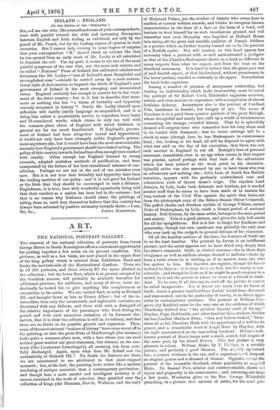IRELAND v. ENGLAND.
[To THE EDITOR OF THE "SPECTATOR.")
SIR,—I am one who, like yourself and some of your correspondents, view with painful interest the wide and increasing divergence between English and Irish feeling as exhibited, not only by the pencil of Mr. Punch, but by the leading organs of opinion in both countries. But r cannot help owning to some degree of surprise that your correspondent "H." should think an extract like that he has quoted from an early work of Mr. Lecky at all calculated to diminish the evil. For my part, it seems to me one of the most painful symptoms of the case that, not the mere mob orators and so-called "National" Press of Ireland, but cultivated scholars and historians like Mr. Lecky—" one of Ireland's most thoughtful and accomplished sons "—should be carried away by a mere conven- tional style of declamation to impeach the whole of England's past government of Ireland in the most sweeping and unmeasured terms. England certainly has enough to answer for in her treat- ment of the sister country ; but is it fair to describe that treat- ment as nothing else but "a tissue of brutality and hypocrisy scarcely surpassed in history "? Surely Mr. Lecky himself upon reflection will hardly justify language so unqualified, and it is doing him rather a questionable service to reproduce these hasty and ill-considered words, which chime in only too well with the common-place abuse of England with which Irishmen in general are far too much familiarized. If England's govern- ment of Ireland had been altogether brutal and hypocritical, it would not only have been strangely unlike England's govern- ment anywhere else, but it would have been the most unaccountable anomaly how England's government should have lasted so long. The
policy of this country towards Ireland has often enough been marked with cruelty. Often enough has England listened to wrong counsels, adopted mistaken methods of pacification, and been exasperated by the failure of her best-intentioned schemes of con- ciliation. Perhaps we are not at the end of our mistakes even now. But it is not true that brutality and hypocrisy have been the leading motives of our policy; and it is not good for Ireland or the Irish that they should be encouraged in such a delusion.
Englishmen, it is true, bear with wonderful equanimity being told that their conduct as a nation has been bad in the extreme ; but that is no reason why Irishmen should abuse the privilege of telling them so, until they themselves believe that this country has always been actuated by positive animosity towards theirs.—I am,


































 Previous page
Previous page